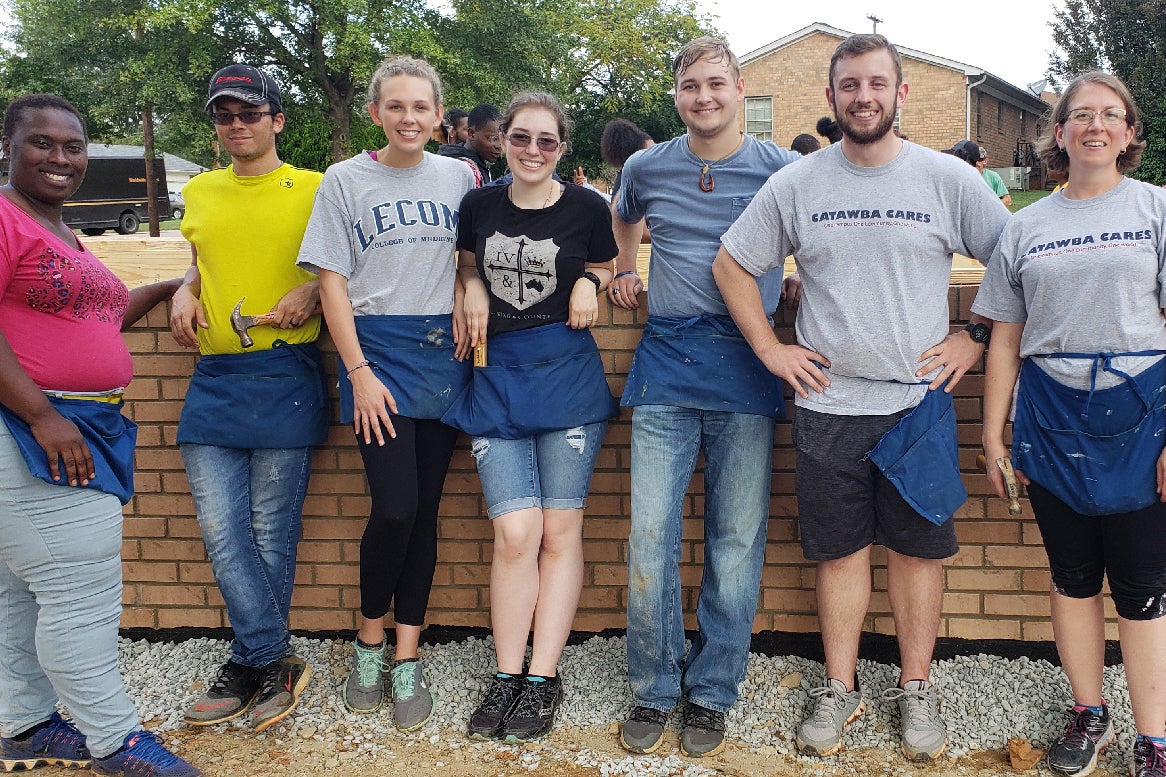Volunteer Catawba: Students learn life of service through volunteerism
Published 12:00 am Thursday, January 31, 2019

- Submitted - Volunteer Catawba students at construction site at Habitat for Humanity in Salisbury, NC. This is a joint project with Livingstone College.
For more than 20 years, Catawba College students have participated in Volunteer Catawba, a program dedicated to giving back to the community in record numbers.
Some three-fourths of day students currently participate: working in partnership with nearby Livingstone College to build a Habitat House; stitching fleece blankets for people living in shelters this winter; delivering holiday gifts to needy children; visiting nursing homes; holding fundraisers for the local pregnancy support center; and building picnic tables and Adirondack chairs for a new dog park behind the city civic center.
The projects vary from the major — as in learning enough construction to actually put a house together “from the ground up” — to projects that program director Johnathan Boles calls “one-and-offs.” An example is the Food for Thought program at Rowan Helping Ministries, in which students and other volunteers package contributed food for weekend meals for students.
The impact on the Salisbury-Rowan community is large. More than 9,000 students, from student athletes in team service to individuals, have participated in volunteer projects while they attended Catawba.
Many volunteer for multiple projects and services and do volunteer work each year of their time at Catawba. Projects range from Walk for Life involving hundreds to a group from the science department doing a demonstration at the local Power Cross Ministries organization, which serves at-risk students in an after-school program.
Catawba student Hannah Parrish said Volunteer Catawba has been one of the best choices that she has made in her college career.
“I’m beyond excited to see what the future holds for us as part of not only Volunteer Catawba but as a community as well,” Parrish said.
She said her work on the Habitat construction project taught her how good it feels to give back. It also opened her eyes to see the world around her.
“(Volunteering) helps me better understand that people are struggling, and I myself can help turn that person’s day around,” she said. “Putting up those four walls of a house we have been working on and then stepping back made me have a sense of not only pride in myself for doing it, but I felt so good knowing that I’m giving a home to someone who truly deserves it.”
Freshman Jack Terrell says Volunteer Catawba is “a family, not an organization.”
“I plan on working with them even after I graduate,” Terrell said. “This kind of work allows students who care about the community and others to come out without being obligated to do so and make a difference.”
Volunteer Catawba began in 1996 with a grant from the United Church of Christ, with which Catawba is affiliated. Peggy Wilson was the first director, and she laid the foundation for the volunteerism spirit at Catawba.
Boles, himself a graduate of Catawba and a participant in the program as an undergrad, said graduates are imprinted with the core value of service and that wherever they live and work, they are giving back.
“The idea is for the four years we have with these students, to hit it hard … to transform the individual,” Boles said. “We know that everyone can give of their time. Time can be the most valuable gift. By the end of their Catawba education, they realize their civic duty as a citizen of the U.S. and the world. They are more giving.”
Four times in the past 10 years, Volunteer Catawba has won the President’s Honor Roll Award for Volunteer Service, one of only 300 institutions of higher learning to receive the award from among 7,000.
Catawba received the awards for community service with distinction, given to organizations that display strong levels of institutional commitment, provide a compelling case for partnership that produces measurable impact in a community and has a federal work student community service percentage of 12 percent or above. The national award program is an initiative of the Corporation for National and Community Service and is administered by Points of Light.
National statistics speak to the relationship of volunteering and paid work: the employment rate of nonworking people who volunteered between 20 and 49 hours per year is up to 57 percent higher than the rate of nonvolunteers.
Accordingly, 96 percent of Catawba College graduates leave with jobs or acceptance into graduate schools
Ken Clapp, chaplain and senior vice president of Catawba, said the college teaches students to think about values and how their values can translate into what they do with their lives.
“Catawba educates the whole student,” says Boles. “We teach vocation and value. Volunteer Catawba helps to bring together talents and ability with societal needs and creates a space where they can intersect. Student volunteers can find vocations that they truly desire.”




